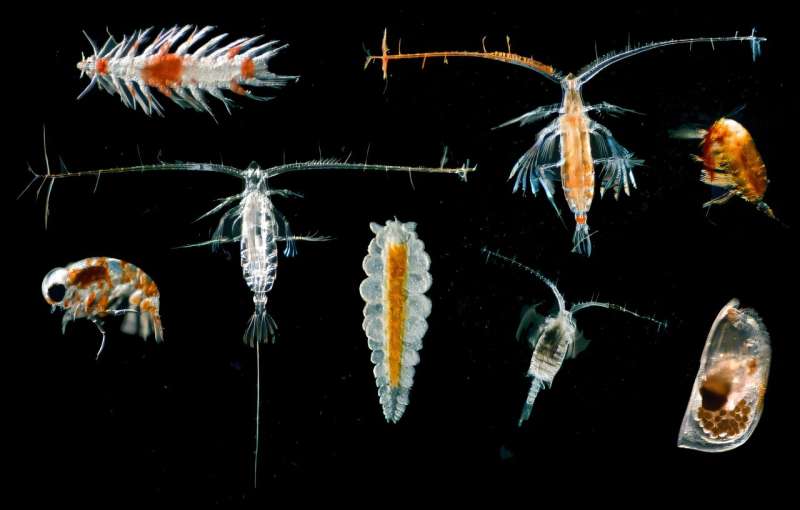Science
Deep-Sea Mining Waste Threatens Ocean Life, Study Reveals

A groundbreaking study from the University of Hawaii at Mānoa has unveiled alarming findings regarding the environmental impacts of deep-sea mining. Published in Nature Communications, this research indicates that waste discharged from mining operations in the Pacific’s biodiverse Clarion-Clipperton Zone (CCZ) poses a significant threat to marine life in the midwater “twilight zone.” This critical area, located between 200 and 1,500 meters below sea level, is home to vast communities of zooplankton, which are essential to the ocean’s food web.
The study highlights that approximately 53% of all zooplankton and 60% of micronekton—small animals that feed on zooplankton—would be negatively affected by the mining discharge. The implications of this could extend up the food chain, impacting larger predators that rely on these organisms.
Michael Dowd, the lead author of the study and a graduate student in the School of Ocean and Earth Science and Technology (SOEST) at UH Mānoa, described the consequences of mining waste entering the ocean, stating, “When the waste released by mining activity enters the ocean, it creates water as murky as the mud-filled Mississippi River.” He explained that the particles released dilute the nutritious food particles essential for zooplankton survival.
The research, titled “Deep-sea mining discharge can disrupt midwater food webs,” focuses on the effects of mining waste released during a trial conducted in 2022 within the CCZ. This area is targeted for the extraction of deep-sea polymetallic nodules, which contain vital minerals such as cobalt, nickel, and copper. Researchers analyzed water samples from the depths where the waste was discharged and found that these particles had significantly lower concentrations of amino acids compared to naturally occurring particles, indicating a decrease in nutritional value.
Erica Goetze, a co-author and professor at SOEST, emphasized the far-reaching consequences of mining, stating, “This isn’t just about mining the seafloor; it’s about reducing the food for entire communities in the deep sea.” The study shows that many species at the depth of discharge depend on naturally occurring particles, which would be replaced by less nutritious mining plume particles.
As global demand for metals used in electric car batteries and other low-carbon technologies rises, some countries are intensifying their efforts in deep-sea mining. Currently, around 1.5 million square kilometers of the CCZ are licensed for this activity.
The Risks of Disrupting Deep-Sea Ecosystems
The deep-sea mining process involves collecting nodules from the ocean floor along with seawater and sediments, which are then transported to a collection ship. The waste, composed of seawater and sediment, is returned to the ocean, often in the midwater twilight zone. This release method raises concerns about the potential impacts on midwater communities, which remain poorly understood.
The twilight zone is home to a rich diversity of marine life, including krill, fish, squid, octopus, and gelatinous species like jellyfish. These organisms play a crucial role in carbon transport, vital for ocean health and, by extension, human well-being. Animals in this zone either feed on the particles available or prey upon those that do, creating a tightly interwoven food web.
Jeffrey Drazen, another co-author and professor at SOEST, pointed out, “Our research suggests that mining plumes don’t just create cloudy water—they change the quality of what’s available to eat, especially for animals that can’t easily swim away.” He likened this situation to “dumping empty calories into a system that’s been running on a finely tuned diet for hundreds of years.”
The study raises pressing concerns regarding the long-term effects of commercial mining, particularly if conducted without stringent environmental protections. The CCZ is also an area where Pacific tuna fisheries operate, meaning that mining waste could affect fish populations impacting global food supply chains.
Brian Popp, a co-author and earth sciences professor at SOEST, remarked, “Deep-sea mining has not yet begun at a commercial scale, so this is our chance to make informed decisions.” He stressed the importance of understanding the midwater ecosystem to avoid damaging communities still being explored.
The authors advocate for their findings to inform international regulatory measures currently being deliberated by the International Seabed Authority and the National Oceanic and Atmospheric Administration in the United States. They call for comprehensive research to ensure the protection of the entire vertical extent of ocean ecosystems.
Drazen added, “Before commercial deep-sea mining begins, it is essential to carefully consider the depth at which mining waste is discharged.” He noted that the impact of mining plumes varies with depth, and improper discharge could harm communities from the ocean surface to the seafloor.
Additional authors of the study include graduate students Victoria Assad and Alexus Cazares-Nuesser, as well as professor Angelicque White. The implications of this research highlight the urgent need for careful consideration and regulation of deep-sea mining to safeguard marine ecosystems.
-

 World3 weeks ago
World3 weeks agoGlobal Air Forces Ranked by Annual Defense Budgets in 2025
-

 World3 weeks ago
World3 weeks agoMass Production of F-35 Fighter Jet Drives Down Costs
-

 Science3 weeks ago
Science3 weeks agoTime Crystals Revolutionize Quantum Computing Potential
-

 World3 weeks ago
World3 weeks agoElectrification Challenges Demand Advanced Multiphysics Modeling
-

 Lifestyle3 weeks ago
Lifestyle3 weeks agoDiscover Reese Witherspoon’s Chic Dining Room Style for Under $25
-

 Top Stories3 weeks ago
Top Stories3 weeks agoNew ‘Star Trek: Voyager’ Game Demo Released, Players Test Limits
-

 Top Stories3 weeks ago
Top Stories3 weeks agoDirecTV to Launch AI-Driven Ads with User Likenesses in 2026
-

 Entertainment3 weeks ago
Entertainment3 weeks agoFreeport Art Gallery Transforms Waste into Creative Masterpieces
-

 Health3 weeks ago
Health3 weeks agoGavin Newsom Critiques Trump’s Health and National Guard Plans
-

 Politics1 week ago
Politics1 week agoLanguage Evolution: New Words Spark Confusion in Communication
-

 Lifestyle3 weeks ago
Lifestyle3 weeks agoLia Thomas Honored with ‘Voice of Inspiration’ Award at Dodgers Event
-

 Business3 weeks ago
Business3 weeks agoGold Investment Surge: Top Mutual Funds and ETF Alternatives









